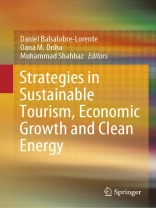This book provides an in-depth analysis of and discussion about the relationship between green tourism, economic growth and globalization. It explores numerous topics relating to tourism including transport efficiency, foreign direct investment, clean energy, climate change dynamics and advances in sustainable tourism management.
The book begins with discussion of sustainable tourism and economic growth, particularly focusing on management strategies. It then presents the relationship between energy use and tourism, looking at green energy and energy shock. It then discusses transport efficiency, tourism efficiency and financial growth in both developed and developing countries.
This book is of interest to researchers, policymakers, and postgraduate students in the areas of energy, environmental and tourism economics.
สารบัญ
Chapter 1. The Impact of Tourism and Renewable Energy Use over Economic Growth in Top 10 Tourism Destinations.- Chapter 2. The Possible Influence of the Tourism Sector on Climate Change in The US. Chapter 3. Tourism Sector and Environmental Quality: Evidence from Top 20 Tourist Destinations.- Chapter 4. The Effects of Tourism, Economic Growth and Renewable Energy on Carbon Dioxide Emissions.- Chapter 5. Clean India Mission and its Impact on Cities of Tourist Importance in India.- Chapter 6. The Effects of Globalization and Terrorism on Tourist Arrivals in Turkey.- Chapter 7. Testing the Dynamic Relationship Among CO2 Emissions, Economic Growth, Energy Consumption and Tourism Development: Evidence For Uruguay.- Chapter 8. Analyzing the Tourism Development and Ecological Footprint Nexus: Evidence from the Countries with Fastest-Growing Rate of Tourism GDP.- Chapter 9. Investigating the Tourism Originating CO2 Emissionsin Top 10 Tourism-Induced Countries: Evidence from Tourism Index.- Chapter 10. Sustainable Tourism Production And Consumption As Constituents Of Sustainable Tourism GDP: Lessons From A Typical Index Of Sustainable Economic Welfare (ISEW).- Chapter 11. Developments & Challenges in The Greek Hospitality Sector for Economic Tourism Growth: The Case of Boutique Hotels.- Chapter 12. Airbnb and Overtourism: An Approach to a Social Sustainable Model Using Big Data.- Chapter 13. Determination of Standard of Living for People Involved with Tourism in Digha by Ordinal Regression Analysis.- Chapter 14. The Validation of the Tourism-Led Growth Hypothesis in the Next Leading Economies: Accounting for the Relevant Role of Education on Carbon Emissions Reduction?.
เกี่ยวกับผู้แต่ง
Dr. Daniel Balsalobre-Lorente holds a Ph.D. in Economics from the University of Castilla–La Mancha, where he is currently an Associate Professor. He has more than ten years of experience as a Professor of Economic Growth, Public Economics and Regional Sciences. His main research activities are focused on the energy economy, energy innovation, economic growth and development economics. He has co-authored several articles in various journals, including
Energy Policy,
Cleaner Production Magazine and
Environmental Science and Pollution Research, as well as several book chapters. He regularly reviews articles for journals such as
Economic Modelling and the
Journal of Cleaner Production.
Dr. Oana M. Driha holds an International Ph D. in Economics from the University of Alicante where she is currently Assistant Professor of Applied Economics. She has nine years of experience as a Professor of International Economics and EU Economics.She has been involved as an expert in numerous EU funded projects in the field of sustainable development (green energy, climate change, sustainable tourism, etc.). Her main research activities are focused on energy economics, energy innovation, economic growth and sustainable tourism. She has co-authored several articles in various journals, including
Resources Policy,
Environmental Science and Pollution Research,
Current Issues in Tourism or
International Journal of Contemporary Hospitality Management, as well as several book chapters. She regularly reviews articles for journals such as
Journal of Cleaner Production or
Technological Forecasting & Social Change.
Dr. Muhammad Shahbaz is a Full Professor at the School of Management and Economics, Beijing Institute of Technology, China. He is also an Affiliated Visiting Scholar at the Department of Land Economy, University of Cambridge, UK, and an Adjunct Professor at COMSATS Institute of Information Technology, Lahore, Pakistan. He previously served as a Chair Professor of Energy and Sustainable Development at Montpellier Business School, France, and Principal Research Officer at COMSATS. He received his Ph.D. in Economics from the National College of Business Administration and Economics, Lahore, Pakistan. His research focuses on financial economics, energy finance, energy economics, environmental economics, development economics and tourism economics. He has published more than 300 research papers in peer-reviewed international journals, is among the world’s top 15 economics authors as ranked by IDEAS, and was selected as one of the top 5 authors on economics in developing countries by David Mc Kenzie, Chief Economist of the World Bank. Dr. Shahbaz has published papers in various journals, including Applied Economics, Social Indicators Research, Renewable Energy and the Journal of Cleaner Production.












